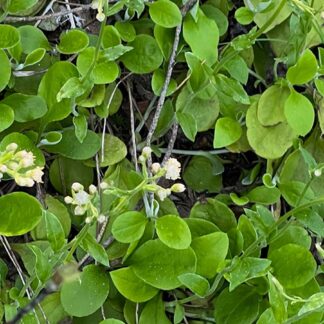raceme
Showing 1–12 of 81 results
-

Actaea rubra / red baneberry
- large, coarsely toothed, deeply lobed compound leaves
- clusters of teeny white flowers that look feathery or fluffy (due to stamens)
- green berries in late summer, maturing to red or white
- black dot at tip of each berry
- moist understory or shade
-

Alyssum desertorum / desert madwort
- short crucifer with teeny leaves, no basal rosettes
- short inflorescence with numerous teeny yellow flowers... short-lived
- seed capsules mature by mid-July, ca. 40/stalk
- disturbed sites of any kind
- often in dense populations
-

Amelanchier alnifolia / serviceberry
- erect shrub (3-18 ft), common in the Valley
- usually several trunks
- compact, fragrant white flower clusters
- star-like flowers
- smallish, light-green, oval leaves
- small, edible blue "berries" by July
- red/orange fall leaf color
-

Antennaria racemosa / Hooker’s pussytoes
- ground-level matte or short stems
- basal leaves
- small clumps/racemes of male or female flowers
- teeny white flowers with white involucres
- moist forest understories
-

Anticlea elegans / mountain death camas
- cream to greenish-white flowers; overall hexagonal appearance
- branched flowering stem with multiple flowers not tightly packed
- 6 tepals (petals + sepals), greenish-yellow nectar glands
- grass/lily-like leaves
- blooms in summer (July/August)
-

Artemisia ludoviciana / white sage
- low, spreading perennial - up to 3 feet tall
- silvery leaves and stems (hairy)
- leaves lance shaped, but sometimes lobed
- shoots die back in winter
- aromatic
-

Artemisia tripartita / threetip sagebrush
- evergreen shrub; branches in broom-like clusters
- all parts covered with silvery/grey-green glandular hairs
- leaves long and very deeply, very distinctly 3-lobed
- flowers in spikes/racemes - all bits teeny, overall yellow-ish/reddish
- often with mountain big sagebrush on nutrient poor soils
-

Astragalus miser / timber milkvetch
- compound leaves with small, egg-shaped leaflets
- teeny, pea-like flowers - bicolored but overall blue/purple
- keel tip is purple and pointed
- small, hairy seed pods
- grassland, meadows, and other open communities
-

Astragalus purshii / woollypod milkvetch
- low growing, silvery, compound leaves; no tendrils
- magenta (or white) "pea-like" flowers with darker keel petal
- "congested" inflorescence
- found in very dry areas, not in shade
-

Barbarea vulgaris / yellow rocket
- showy yellow brassica with relatively large flowers
- leaves deeply lobed with larger terminal lobe, smaller toward top of stems
- common on roadsides and waste places in spring
- siliques about an inch long and curving upward, with beaks and pedicels
-

Beteroa incana / hoary alyssum
- dense clusters of teeny white flowers
- 4 petals, each with a notch
- fruit is a short, fat-ish seed pod (silicle)
- found in pastures and all manner of disturbed habitats
- toxic to horses
-

Bistorta bistortoides / American bistort
- rocky areas, tundra/alpine
- inflorescence a 2" dense cylinder with many teeny white flowers
- notable protruding stamens
- leaves basal, long/thin and leathery
Showing 1–12 of 81 results